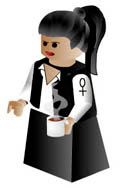Remember when I said I was afraid to finish it for fear it wouldn't be that good all the way through? It's that good all the way through! No lie. It's that good. Reconstruction, hope and heartbreak. Such a fierce read!
I was thinking about that book (and the indignant reviews) while I was hanging out the window, yesterday, pruning back the bougainvillea.
How is it that I never knew bougainvillea has thorns? big, ass-kicking thorns! I was looking at my palms with that little girl looks of surprise at pain. (See that? It wasn't even my palms, it was my fingers, but right away i gotta do that stigmata thing and say it was my palms!)
Over and over I kept repeating one sentence that Garlic says to Cynara, when she wants to know, did ya'll really kill [somebody]? He says to her "If we didn't, it was because we didn't have to."
I think it would be really interesting to read this book with Kindred or 47. Because--though I never realized it before--those books (that I LOVE) continue with certain conventions of the sentimental novel. People of color have to be GOOD, even in the face of evil. And that can mean "collaboration." I guess I'm thinking in terms of the postcolonial. Kindred is both about innocence, and not about innocence. What if Dana had decided to go the other way, and make sure that rusty-headed boy drowns? In a certain kind of way, she can't do that, precisely because she's a twentieth-century subject. And the slaves all rely on her to "save" him, and thus save them from worse circumstances. Without necessarily admitting it--without finding peace in it-- Dana chooses Rufous over Alice. And thus she is complicit in what happens to Alice, and as guilty as Rufous, in the end. The logic of white patriarchy corrupts.
But TWDG does not rely on "saving" certain white men as a way of "saving" black people. What's so scary about the book for some people is the way it refuses the "innocent" black subject. It refuses subservience, it refuses victimhood. Even as it shows how complicated everything is.
I love how she tells Lady's history. I guess for me, that is a salvation. And yet Phillippe duels to his death because he can't imagine his lover with a black man!
I've also been thinking about the challenge in both Kindred and 47, where there is clearly the message that "you let someone make you a slave." That's something that both Tall John and Dana say to the slaves, which just feels so unfair. Especially in light of history. Is that a secret emotion of twentieth-century African American subjects? How could you let yourselves be enslaved? TWDG is a fantasy, right? That, in fact, you did not let yourselves be enslaved: that to the extent that you were able--an extent never even imagined by white folks or Black folks, and an extent that would horrify them--you took power, changed the course of history, ensured your survival and the survival of your people.
sábado, octubre 22, 2005
The Wind Done Gone (after the fact)
Posted by
Ktrion
at
12:26 p.m.
![]()
Suscribirse a:
Comentarios de la entrada (Atom)


No hay comentarios.:
Publicar un comentario